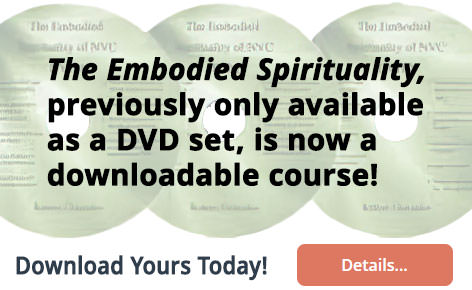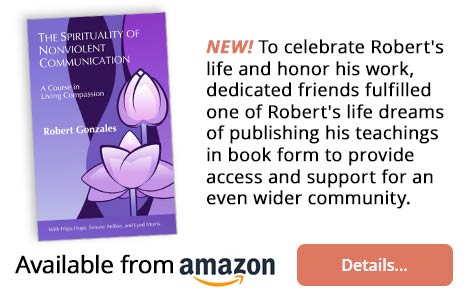

Welcome to the Robert Gonzales Training Legacy. Here you can learn more about Robert and the powerful teachings he dedicated his life to. NVC Academy is proud to house and share with you the complete body of his life's work. We invite you to explore, learn, and help keep his legacy alive!
Robert's passion was in the spirituality of the Nonviolent Communication (NVC) process. He saw NVC both as a process that helps people connect more authentically with themselves and others, and as a spiritual practice and way of living. The worldwide NVC community mourned when Robert died in 2021. He left behind a legacy of work that emerged from a lifetime of inquiry into the intersection between spirituality and human communication. More about Robert.
Article
4-6 minutes
Tolerating reactivity, name-calling, blaming, guilt-tripping, or stonewalling can lead to resentment and hurt. Plus, the more you stay in a reactive dynamic, the more you are likely to reinforce the pattern. Setting life-serving boundaries around reactivity is about letting another know that you aren’t going to participate in that kinds of dynamics. This means knowing what helps with handling difficulties and asking for that.
Details...Article
4 - 6 minutes
Most of us subject ourselves to so many painful mental jabs and they seldom stimulate helpful change. We can be like a frustrated animal trainer repeatedly whipping an animal, without ever helping the animal to understand what behavior is wanted or offering encouragement. Instead, punishing thoughts can be stepping stones to awareness. We can focus on sensing what we're really aspiring to. This is more likely to eventually produce sustainable change that'll serve us better.
Details...Article
15 - 23 minutes
The existing unequal risks and impacts people of certain race, class and identities face in society is magnified in these strenuous times -- especially with things such as illness, financial well being, discrimination, attacks, and death. As responsive NVC practitioners we can stand in solidarity with those who are differentially impacted. Read on for this, and additional ways to spot common pitfalls of doing so.
Details...Article
7 - 11 minutes
It’s essential to give ourselves time to grapple with the complex feelings surrounding the brutality of state-sanctioned racism and violence. But if all we do is reflect and attend to our emotions we fail to show up, where and when it counts. So let's not perpetuate the violence by standing idly. Instead, here's ten things you can do to move into concrete action to address the continued, untenable, and horrific violence of racism. A list of resources is included.
Details...Article
23 - 34 minutes
Amidst racial violence, there are things that NVC can offer. And there are places where NVC culture needs to be more vigilant. Here are examples of where, amidst incredible loss and pain, "allies" and communities commonly (and often unknowingly) create false equivalences, minimization and re-injure those who've been historically marginalized -- even when they offer empathy, or aim to stay "safe". Read on to cultivate greater understanding and ways to respond differently.
Details...Article
8 - 12 minutes
Perhaps human violence persists because we believe that violence is inevitable and there's nothing we can do about it -— even though there is notable evidence that this is likely not true. Read on for some research and theory on how cultures evolve to be collaborative or violent. Plus, learn benefits of collaboration and downsides to force, punishment, and control. These provide implications for how we might move towards a culture of more peace.
Details...Article
5 - 8 minutes
What's my intention? What needs am I trying to meet? What do I want the other person to know or understand? How can I say it in a way they are most likely to hear? These are four questions we can use in preparation for an important conversation. Read on for more on this, plus four accompanying practices.
Details...Article
7 - 11 minutes
With abundant evidence that most people have unconscious biases against people --even when that bias runs counter to their own values-- there's a strong chance you recreate this disconnect with people far more often than you recognize. So even with a high degree of NVC skills you may behave in a way that seems "NVC" but also reproduces the painful patterns that marginalized people all-too-often experience. Read on for ways to transform pitfalls of NVC into more reliable connection.
Details...Article
6 - 8 minutes
The less blame and criticism, the easier it is for others to hear us. From this perspective, it’s in our best interest to come from curiosity and care. This way differences can bring us together and help us know one another. The more mutual understanding, the easier it is to work together and find creative solutions. Read on for more on this, with a story about how a black man inspired 200 members of the KKK to leave the organization.
Details...Article
5 - 8 minutes
Sometimes when we regard needs as something that could be met or unmet by another person or by a situation we unconsciously hold the belief that our needs should be met. Or we end up holding blame or implying wrongdoing. People are more likely to resist a request made from this stance. Instead, here are practices to increasingly losen any remaining attachment or demand energy -- and open our hearts to ourselves and others while we make requests.
Details...

